Key Takeaways from St. JP II's Letter to Women

Key Takeaways from St. JP II's Letter to Women
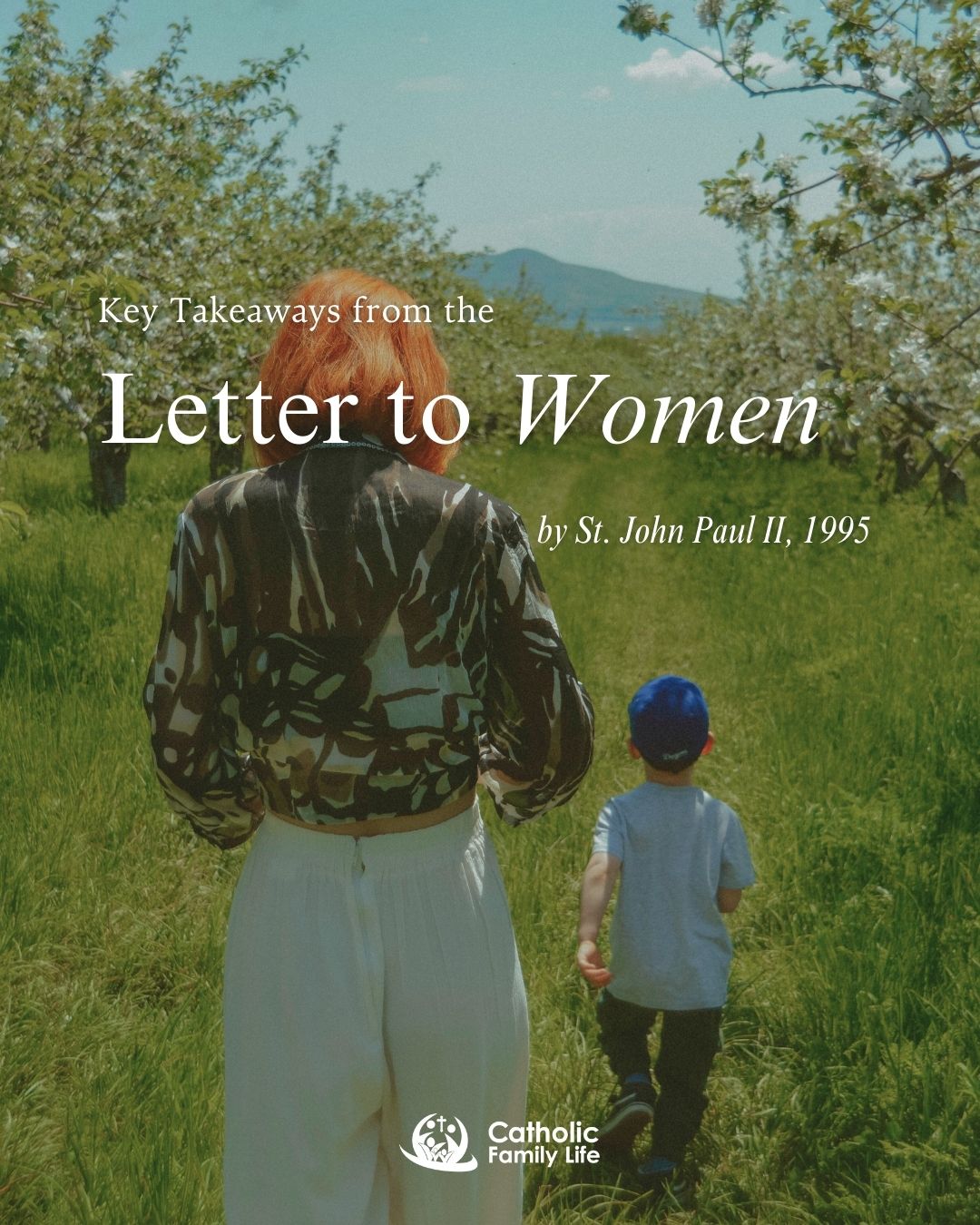
St. Teresa Benedicta of the Cross (Edith Stein) once said “The world doesn’t need what women have, it needs what women are.” In modern times, it is far easier to flow with the current. We desire to be relevant, significant and to belong. Our identity gets easily built on passing things of the world - education, background, appearance, job etc. The secular world will try to define and exploit our identity as women but we must never allow these noises to drown the spiritual gifts that God has bestowed on us. St. John Paul II, a saint of our times, wrote a letter and apostolic exhortation on women (Mulieris Dignitatem) points us to the core identity of what it means to be female as God created us to be. His spiritual fatherhood broadens our perception and aids us in eradicating our own false notions of what being a Catholic woman of our times means.
Here are 4 takeaways from reading the letter:
1. The Gift of Womanhood
St. John Paul II expressed his gratitude to women for the simple fact of being a woman. Some would say that he believed in the gift of womanhood more than some of us women ever have. “Gift”, as the dictionary defines it, “is a present or something that is Given”. God, our loving creator, has bestowed this great gift on us, and we honor it by simply claiming and embracing it. Yet, how difficult is that? Especially in a culture that prides ourselves on doing and being more. We often feel not good enough yet too much at the same time. Perhaps, we have manipulated, controlled, shied away or abused our womanhood. The Pope sheds light on the innate qualities that we have received in the various roles and vocations that women play in today’s society. Women who are Mothers, Wives, Daughters, Sisters, Women who work and Consecrated women. Each one of us is given a particular mission to use our gifts to help human relationships be more honest and authentic.
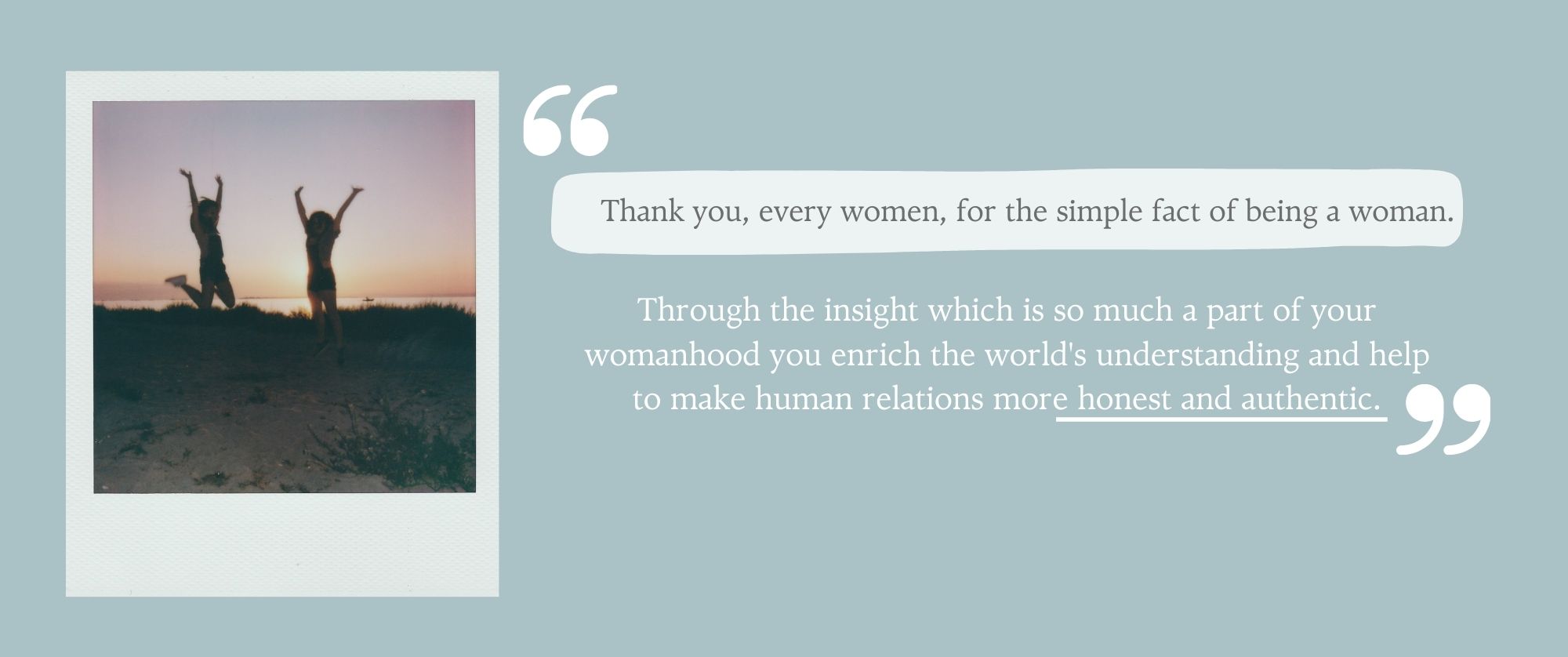
2. Freedom in Jesus
In his letter, Pope John Paul II acknowledges the obstacles and struggles that have threatened the gift of womanhood. There is no doubt that actions of the past have shaped today’s society. In many countries, the dignity of women often goes unacknowledged, and their rights are misrepresented. While threats to our dignity are still present, the Gospel message is the antidote of our time. The Pope writes that “Transcending the established norms of his own culture, Jesus treated women with openness, respect, acceptance and tenderness.” Jesus’ attitude towards women offers us a path of freedom from exploitation and domination. We clearly see this lived out in the passages of the Samaritan woman, the woman who had a hemorrhage, and many more interactions between Jesus and women in the bible. How many of us resonate with those women in the bible? Feeling hopeless, ashamed, desperate or wounded.
Jesus himself, shows us how to honor the dignity which women possess according to God's plan and in his love. The Lord has come to restore and rewrite our identity as women, no matter what baggage we carry in our hearts. As St. John Paul II says, scripture equips us to understand that the dignity of women is not merely a social construct or cultural preference but is rooted in the very essence of what it means to be human (Gen 1:27). It is an intrinsic aspect of human nature that must be acknowledged, respected, and upheld in all aspects of life.
Dear sisters, we must be convicted that our intrinsic worth and dignity comes from God and bear witness to this precious gift for other women as well.
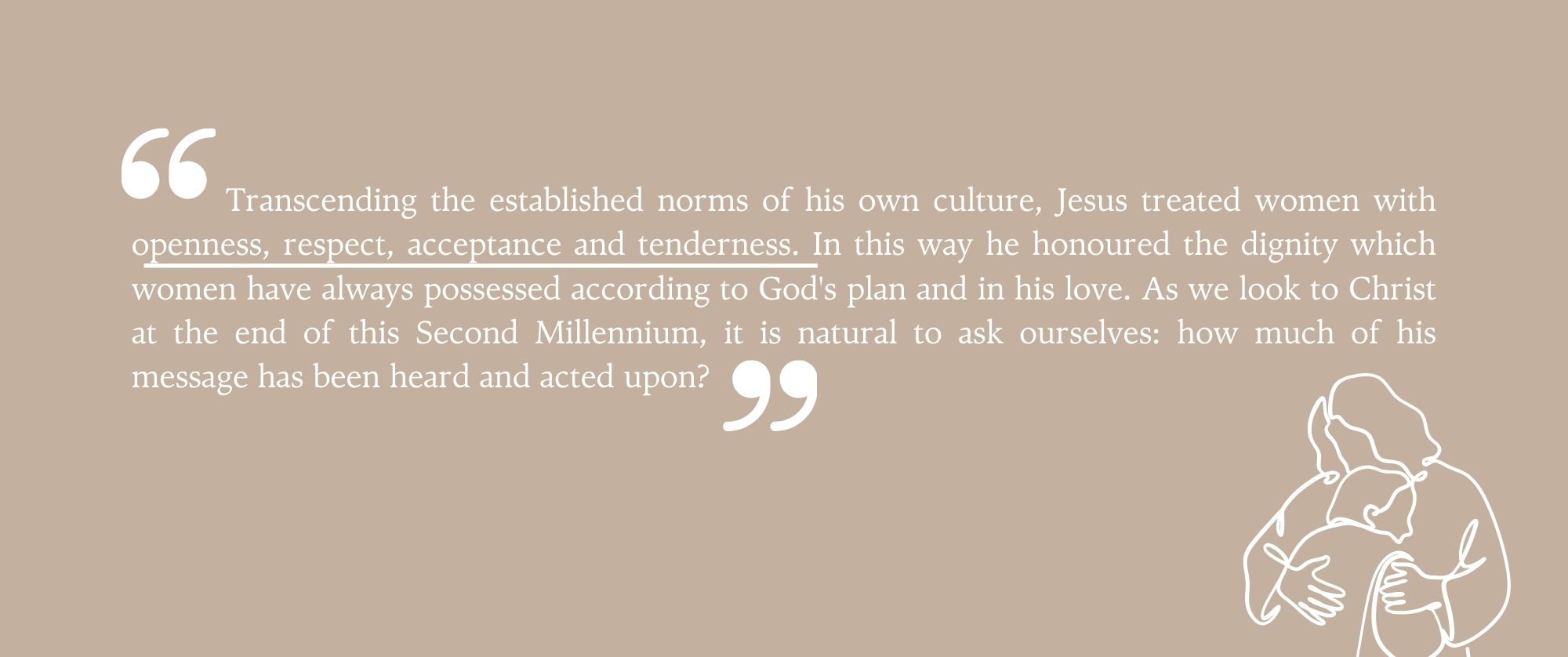
3. Feminine Genius: Becoming the Woman God Called Us to Be
St. John Paul II expressed concern about our culture’s emphasis on women's physical beauty over their skills, professionalism, intellect and deep sensitivity. Women offer more to the world than just our physical appearance and this was beautifully encapsulated in what the saint introduced as the ‘feminine genius’ in his letter Mulieris Dignitatem. In the apostolic letter, he highlighted women’s gifts of (a) Receptivity (ii) Maternity (iii) Sensitivity (iv) Generosity. Although St. John Paul II did not dive deeper on the 4 gifts that women possess in his letter to women, he encouraged women to let their feminine gifts be fully expressed in the life of society and the Church.
Who can we look to for inspiration? The church sees Mother Mary as the ultimate embodiment of this “feminine genius”, exemplified by her obedience to God and her role as a mother of Jesus. She put herself at the service of God and others, to be a wife and mother in the Holy Family but also a mother to the human race. Like Mary, all of us women are called to be a “genius” of receptivity—biologically, emotionally, and spiritually. Thus, it is important that we recognise the profound dimension of our calling as women: Motherhood. While it includes the physical act of bearing children, it extends to nurturing others in spiritual growth as well. Our capacity to care, evident even in our biological makeup, is a unique gift. We share in the divine act of creation with God—a truly special role. Yet, as the Pope aptly notes, “the gift of motherhood is often penalized rather than rewarded”. This societal attitude contributes to record-low fertility rates. Let us ponder on how we can safeguard the call of Motherhood today and honor the gift of our own feminine genius.
4. Helpmate
Since the beginning of time, Women were created because it was “not good that the man should be alone” (Gen 2:20). St. John Paul II says that the creation of women is marked from the outset by the principle of help: a help which is not one-sided but mutual. In his letter to women, the Pope shares beautifully how as women, we were made as “helpmates”. So what is a helpmate? The word “helper” translates ezer in Hebrew, which indicates a particular kind of help that can be given only by God. It is often wrongly assumed that a helper is someone who is a “servant.” The biblical meaning does not refer to this kind of help but rather, to a heavenly aid — just as how God comes to our help.
He goes on to add that Womanhood expresses the "human" as much as manhood does, but in a different and complementary way. In this day and age, we often find women and men competing with each other. Even amongst women ourselves, we compete with each other over many things - attention, recognition, affirmation. We fall into unhealthy competition and jealousy simply because we feel threatened or desire to grasp for something or someone we haven not yet possessed. In such situations, we are living from a place of insecurity and a scarcity mindset rather than God’s providence. To accept the truth of our complementarity, we must first accept our own weaknesses and see that these are areas where someone else’s strength can aid us and vice versa. Women are thus called to complement men by entering into this interpersonal communion with mutual help. A suitable wife is compatible with her husband in various aspects— physically, mentally, emotionally, and spiritually. Our call then, as ordinary women, is to reveal the gift of our womanhood by being sensitive, attentive and generous in helping others.
Who can we look to for inspiration? The church sees Mother Mary as the ultimate embodiment of this “feminine genius”, exemplified by her obedience to God and her role as a mother of Jesus. She put herself at the service of God and others, to be a wife and mother in the Holy Family but also a mother to the human race. Like Mary, all of us women are called to be a “genius” of receptivity—biologically, emotionally, and spiritually. Thus, it is important that we recognise the profound dimension of our calling as women: Motherhood. While it includes the physical act of bearing children, it extends to nurturing others in spiritual growth as well. Our capacity to care, evident even in our biological makeup, is a unique gift. We share in the divine act of creation with God—a truly special role. Yet, as the Pope aptly notes, “the gift of motherhood is often penalized rather than rewarded”. This societal attitude contributes to record-low fertility rates. Let us ponder on how we can safeguard the call of Motherhood today and honor the gift of our own feminine genius.
4. Helpmate
Since the beginning of time, Women were created because it was “not good that the man should be alone” (Gen 2:20). St. John Paul II says that the creation of women is marked from the outset by the principle of help: a help which is not one-sided but mutual. In his letter to women, the Pope shares beautifully how as women, we were made as “helpmates”. So what is a helpmate? The word “helper” translates ezer in Hebrew, which indicates a particular kind of help that can be given only by God. It is often wrongly assumed that a helper is someone who is a “servant.” The biblical meaning does not refer to this kind of help but rather, to a heavenly aid — just as how God comes to our help.
He goes on to add that Womanhood expresses the "human" as much as manhood does, but in a different and complementary way. In this day and age, we often find women and men competing with each other. Even among women ourselves, we compete with each other over many things - attention, recognition, affirmation. We fall into unhealthy competition and jealousy simply because we feel threatened or desire to grasp something or someone we have not yet possessed. In such situations, we are living in a place of insecurity and a scarcity mindset rather than God’s providence. To accept the truth of our complementarity, we must first accept our own weaknesses and see that these are areas where someone else’s strength can aid us and vice versa. Women are thus called to complement men by entering into this interpersonal communion with mutual help. A suitable wife is compatible with her husband in various aspects— physically, mentally, emotionally, and spiritually. Our call then, as ordinary women, is to reveal the gift of our womanhood by being sensitive, attentive and generous in helping others.
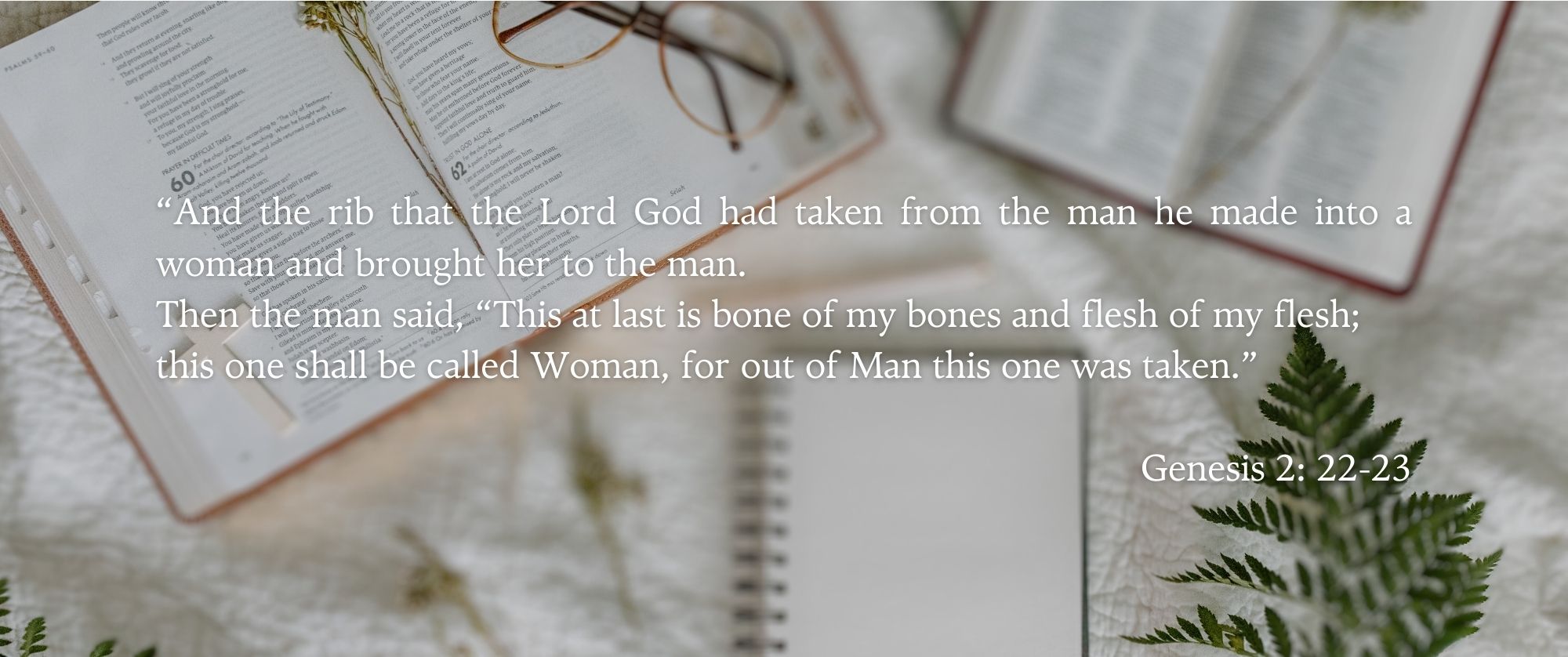
What does this mean for us?
Echoing St. John Paul II, it is “in giving themselves to others each day women fulfill their deepest vocation.” May we learn from the Mother of God, to be women of Faith and virtue, rooted in our identity as God’s beloved. We must not only view others using our intellect but encounter each individual with our hearts. The world needs who women are, not what we are, how might we allow God to use our feminine gifts to be channels of His Grace?
Let us begin today.
St. Teresa Benedicta of the Cross (Edith Stein) once said “The world doesn’t need what women have, it needs what women are.” In modern times, it is far easier to flow with the current. We desire to be relevant, significant and to belong. Our identity gets easily built on passing things of the world - education, background, appearance, job etc. The secular world will try to define and exploit our identity as women but we must never allow these noises to drown the spiritual gifts that God has bestowed on us. St. John Paul II, a saint of our times, wrote a letter and apostolic exhortation on women (Mulieris Dignitatem) points us to the core identity of what it means to be female as God created us to be. His spiritual fatherhood broadens our perception and aids us in eradicating our own false notions of what being a Catholic woman of our times means.
Here are 4 takeaways from reading the letter:
1. The Gift of Womanhood
St. John Paul II expressed his gratitude to women for the simple fact of being a woman. Some would say that he believed in the gift of womanhood more than some of us women ever have. “Gift”, as the dictionary defines it, “is a present or something that is Given”. God, our loving creator, has bestowed this great gift on us, and we honor it by simply claiming and embracing it. Yet, how difficult is that? Especially in a culture that prides ourselves on doing and being more. We often feel not good enough yet too much at the same time. Perhaps, we have manipulated, controlled, shied away or abused our womanhood. The Pope sheds light on the innate qualities that we have received in the various roles and vocations that women play in today’s society. Women who are Mothers, Wives, Daughters, Sisters, Women who work and Consecrated women. Each one of us is given a particular mission to use our gifts to help human relationships be more honest and authentic.
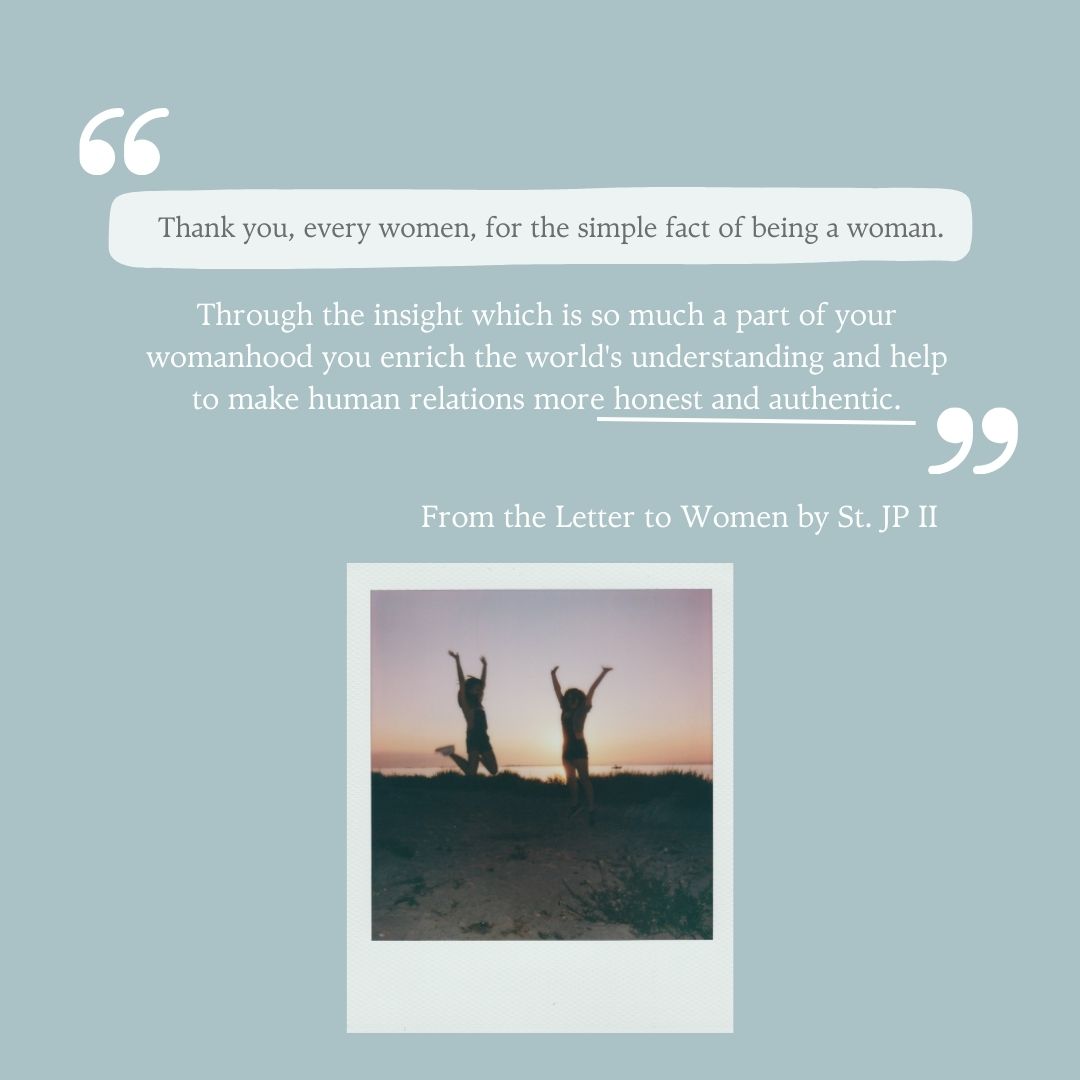
2. Freedom in Jesus
In his letter, Pope John Paul II acknowledges the obstacles and struggles that have threatened the gift of womanhood. There is no doubt that actions of the past have shaped today’s society. In many countries, the dignity of women often goes unacknowledged, and their rights are misrepresented. While threats to our dignity are still present, the Gospel message is the antidote of our time. The Pope writes that “Transcending the established norms of his own culture, Jesus treated women with openness, respect, acceptance and tenderness.” Jesus’ attitude towards women offers us a path of freedom from exploitation and domination. We clearly see this lived out in the passages of the Samaritan woman, the woman who had a hemorrhage, and many more interactions between Jesus and women in the bible. How many of us resonate with those women in the bible? Feeling hopeless, ashamed, desperate or wounded.
Jesus himself, shows us how to honor the dignity which women possess according to God's plan and in his love. The Lord has come to restore and rewrite our identity as women, no matter what baggage we carry in our hearts. As St. John Paul II says, scripture equips us to understand that the dignity of women is not merely a social construct or cultural preference but is rooted in the very essence of what it means to be human (Gen 1:27). It is an intrinsic aspect of human nature that must be acknowledged, respected, and upheld in all aspects of life.
Dear sisters, we must be convicted that our intrinsic worth and dignity comes from God and bear witness to this precious gift for other women as well.
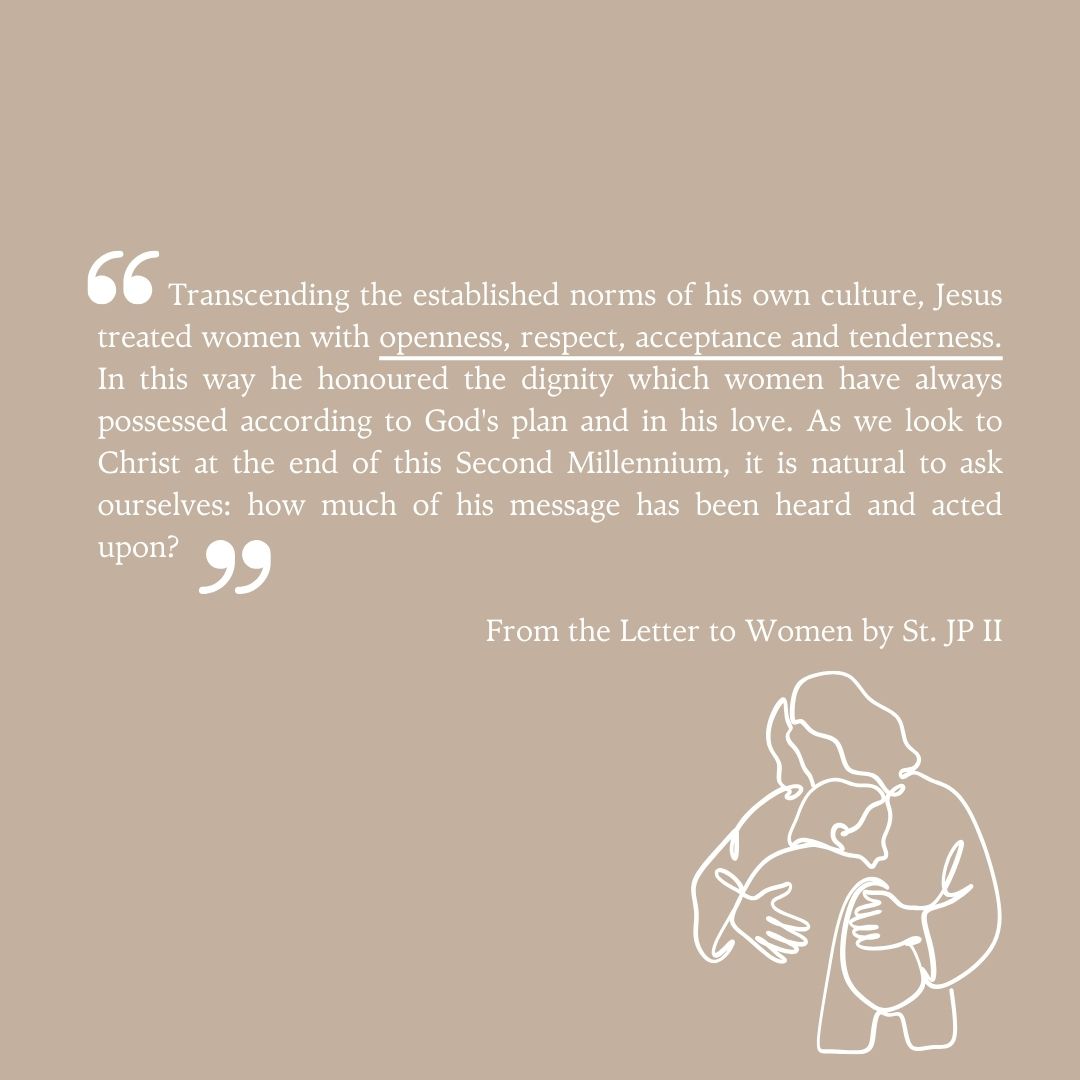
3. Feminine Genius: Becoming the Woman God Called Us to Be
St. John Paul II expressed concern about our culture’s emphasis on women's physical beauty over their skills, professionalism, intellect and deep sensitivity. Women offer more to the world than just our physical appearance and this was beautifully encapsulated in what the saint introduced as the ‘feminine genius’ in his letter Mulieris Dignitatem. In the apostolic letter, he highlighted women’s gifts of (a) Receptivity (ii) Maternity (iii) Sensitivity (iv) Generosity. Although St. John Paul II did not dive deeper on the 4 gifts that women possess in his letter to women, he encouraged women to let their feminine gifts be fully expressed in the life of society and the Church.
Who can we look to for inspiration? The church sees Mother Mary as the ultimate embodiment of this “feminine genius”, exemplified by her obedience to God and her role as a mother of Jesus. She put herself at the service of God and others, to be a wife and mother in the Holy Family but also a mother to the human race. Like Mary, all of us women are called to be a “genius” of receptivity—biologically, emotionally, and spiritually. Thus, it is important that we recognise the profound dimension of our calling as women: Motherhood. While it includes the physical act of bearing children, it extends to nurturing others in spiritual growth as well. Our capacity to care, evident even in our biological makeup, is a unique gift. We share in the divine act of creation with God—a truly special role. Yet, as the Pope aptly notes, “the gift of motherhood is often penalized rather than rewarded”. This societal attitude contributes to record-low fertility rates. Let us ponder on how we can safeguard the call of Motherhood today and honor the gift of our own feminine genius.
4. Helpmate
Since the beginning of time, Women were created because it was “not good that the man should be alone” (Gen 2:20). St. John Paul II says that the creation of women is marked from the outset by the principle of help: a help which is not one-sided but mutual. In his letter to women, the Pope shares beautifully how as women, we were made as “helpmates”. So what is a helpmate? The word “helper” translates ezer in Hebrew, which indicates a particular kind of help that can be given only by God. It is often wrongly assumed that a helper is someone who is a “servant.” The biblical meaning does not refer to this kind of help but rather, to a heavenly aid — just as how God comes to our help.
He goes on to add that Womanhood expresses the "human" as much as manhood does, but in a different and complementary way. In this day and age, we often find women and men competing with each other. Even amongst women ourselves, we compete with each other over many things - attention, recognition, affirmation. We fall into unhealthy competition and jealousy simply because we feel threatened or desire to grasp for something or someone we haven not yet possessed. In such situations, we are living from a place of insecurity and a scarcity mindset rather than God’s providence. To accept the truth of our complementarity, we must first accept our own weaknesses and see that these are areas where someone else’s strength can aid us and vice versa. Women are thus called to complement men by entering into this interpersonal communion with mutual help. A suitable wife is compatible with her husband in various aspects— physically, mentally, emotionally, and spiritually. Our call then, as ordinary women, is to reveal the gift of our womanhood by being sensitive, attentive and generous in helping others.
Who can we look to for inspiration? The church sees Mother Mary as the ultimate embodiment of this “feminine genius”, exemplified by her obedience to God and her role as a mother of Jesus. She put herself at the service of God and others, to be a wife and mother in the Holy Family but also a mother to the human race. Like Mary, all of us women are called to be a “genius” of receptivity—biologically, emotionally, and spiritually. Thus, it is important that we recognise the profound dimension of our calling as women: Motherhood. While it includes the physical act of bearing children, it extends to nurturing others in spiritual growth as well. Our capacity to care, evident even in our biological makeup, is a unique gift. We share in the divine act of creation with God—a truly special role. Yet, as the Pope aptly notes, “the gift of motherhood is often penalized rather than rewarded”. This societal attitude contributes to record-low fertility rates. Let us ponder on how we can safeguard the call of Motherhood today and honor the gift of our own feminine genius.
4. Helpmate
Since the beginning of time, Women were created because it was “not good that the man should be alone” (Gen 2:20). St. John Paul II says that the creation of women is marked from the outset by the principle of help: a help which is not one-sided but mutual. In his letter to women, the Pope shares beautifully how as women, we were made as “helpmates”. So what is a helpmate? The word “helper” translates ezer in Hebrew, which indicates a particular kind of help that can be given only by God. It is often wrongly assumed that a helper is someone who is a “servant.” The biblical meaning does not refer to this kind of help but rather, to a heavenly aid — just as how God comes to our help.
He goes on to add that Womanhood expresses the "human" as much as manhood does, but in a different and complementary way. In this day and age, we often find women and men competing with each other. Even among women ourselves, we compete with each other over many things - attention, recognition, affirmation. We fall into unhealthy competition and jealousy simply because we feel threatened or desire to grasp something or someone we have not yet possessed. In such situations, we are living in a place of insecurity and a scarcity mindset rather than God’s providence. To accept the truth of our complementarity, we must first accept our own weaknesses and see that these are areas where someone else’s strength can aid us and vice versa. Women are thus called to complement men by entering into this interpersonal communion with mutual help. A suitable wife is compatible with her husband in various aspects— physically, mentally, emotionally, and spiritually. Our call then, as ordinary women, is to reveal the gift of our womanhood by being sensitive, attentive and generous in helping others.
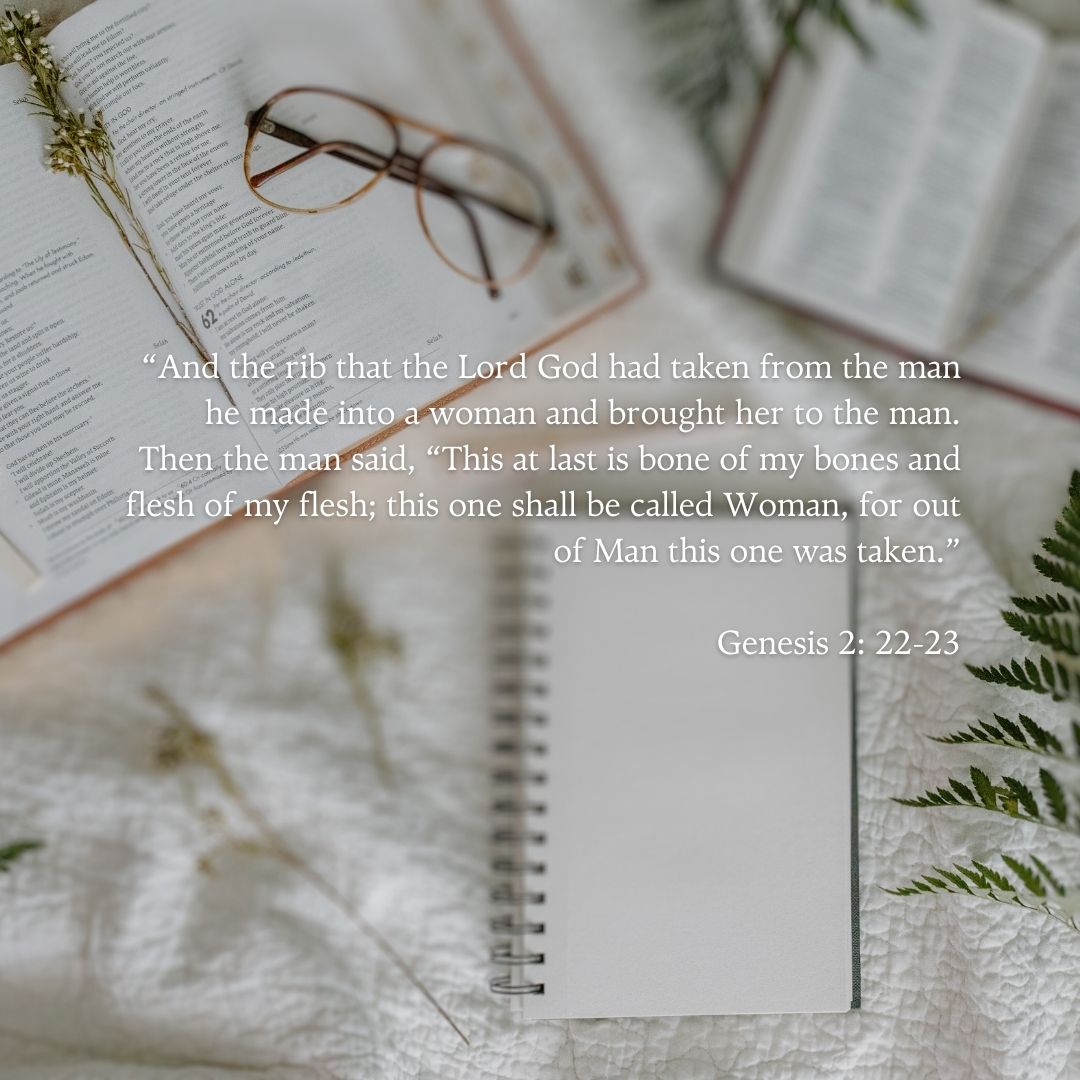
What does this mean for us?
Echoing St. John Paul II, it is “in giving themselves to others each day women fulfill their deepest vocation.” May we learn from the Mother of God, to be women of Faith and virtue, rooted in our identity as God’s beloved. We must not only view others using our intellect but encounter each individual with our hearts. The world needs who women are, not what we are, how might we allow God to use our feminine gifts to be channels of His Grace?
Let us begin today.
Main Line & Therapy Appointment
WhatsApp: 9126 9086
Pregnancy Crisis
& Support
Hotline: 6339 9770
WhatsApp: 9126 9061
Pro-Bono Counselling
6631 8963
Mon - Fri between 12pm – 4pm
Connect With Us
A Member Of

Copyright © 2025 Catholic Family Life. All rights reserved.
